DUBAI: The pragmatic nature of the commercial relationship between the UAE and the Jewish business community is well illustrated by a piece of Dubai folklore.
The story goes that at the beginning of the 2000s, when the Dubai International Financial Centre (DIFC) was under construction, the emirate’s leaders wanted to attract the very best brains in international finance to the new business hub.
They settled on one of the best-known names on Wall Street, an illustrious institution but with a significant Jewish heritage.
The bank was considering an attractive proposition to be an anchor tenant in the DIFC, until the question arose of the financiers’ ability to practice their faith if they moved to the UAE.
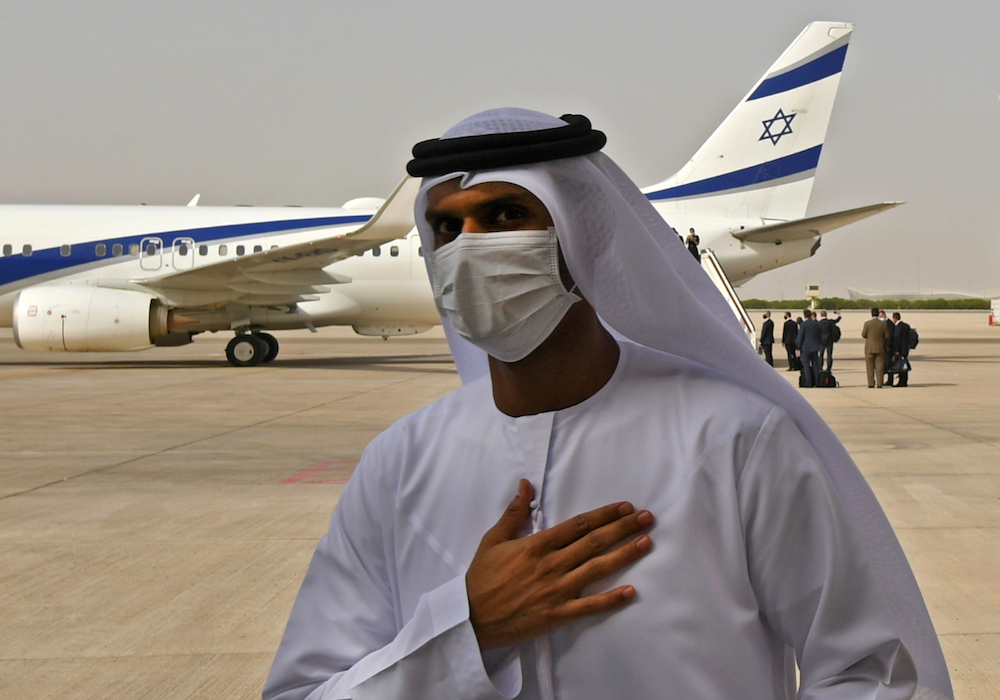
An Emirati official stands near an air-plane of El Al, which carried a US-Israeli delegation to the UAE following a normalisation accord, upon it's arrival at the Abu Dhabi airport in the first-ever commercial flight from Israel to the UAE, on August 31, 2020. (AFP/File Photo)
A compromise was reached in discussions at the highest levels: If the bankers were discreet, Dubai saw no problem in allowing them to use a private villa as a place of worship.
So was born the Jumeirah synagogue, a villa in Dubai’s upmarket residential district that has been used for years by the faithful, but whose existence was only acknowledged last year.
The bank is still a mainstay of the DIFC, where it has its regional headquarters and does business in all the Gulf countries.
That story, part of Dubai’s urban mythology, is a perfect illustration of the kind of mutual business benefit that can be expected from the entente cordiale between the UAE and Israel.
Similar commercial advantages are expected to come from Bahrain’s move to also normalize relations.
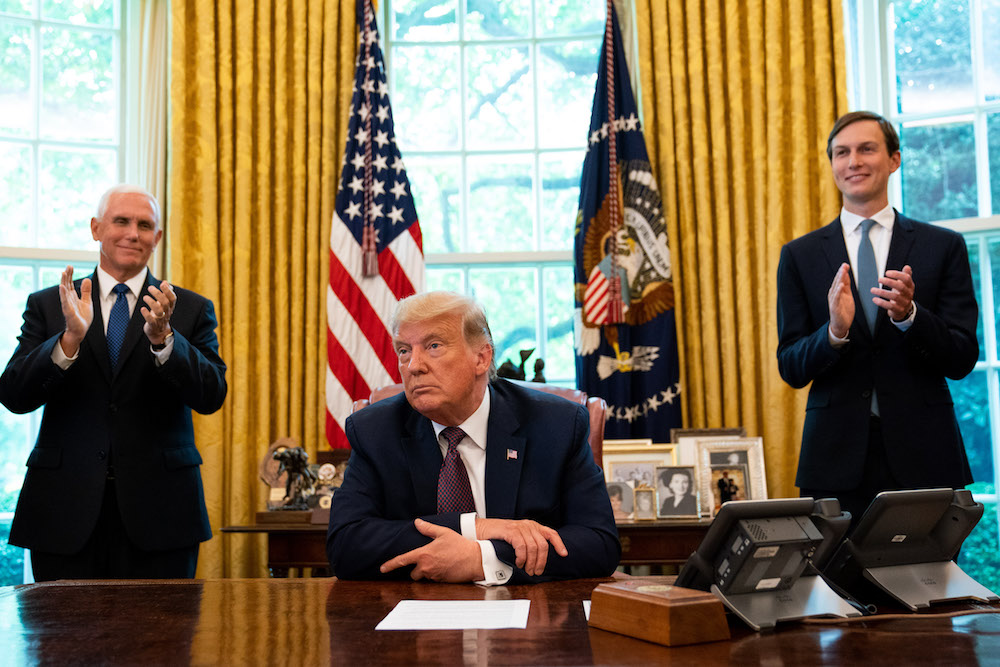
President Donald Trump, flanked by U.S. Vice President Mike Pence (L) and Advisor Jared Kushner, speaks in the Oval Office to announce that Bahrain will establish diplomatic relations with Israel, at the White House in Washington, DC on September 11, 2020. (AFP)
Business professionals in both the UAE and Bahrain have already begun to explore the potential “peace dividend” from a new relationship with Israel. Nor have their Israeli counterparts been slow in seeing the potential.
Sabah Al-Binali, an Emirati entrepreneur and financial expert, told Arab News: “The new partnership makes a compelling and cogent case. The UAE has financial capital in excess of what can be put to effective use within the country, which is why we have sovereign wealth funds. Israel has the advantages of human capital and ingenuity from all around the world. It’s a perfect fit.”
Not surprisingly, the financial industry was one of the first to explore the mutual potential between the Arabian Gulf and Israel.
Two of Israel’s biggest banks — Leumi and Hapoalim — arranged for executives to travel to the UAE soon after the entente was announced for talks with Emirates NBD and First Abu Dhabi Bank, the two biggest in the country.
INNUMBERS
GDP in billions of USD
* 421.142 UAE
* 395.099 Israel
* 38.574 Bahrain
“The spectrum of deals is huge,” one of the Israeli executives said, though none has been announced yet.
Apart from direct financial and banking relationships, Israeli investors are thought to be keen to take advantage of historically low valuations in UAE real estate, both residential and commercial, and possibly get involved in the mortgage market in the Gulf.
Likewise, officials at the DIFC and the Abu Dhabi Global Market, the two big financial hubs in the UAE, are eagerly anticipating an influx of the professional firms that support the banking and financial sectors in those high-value developments.
Law firms have been quick off the mark. Paul Jaffa, a UK-based executive who runs a communications business, Myddleton Communications — active in both Israel and the UAE — sees big potential for law firms acting for clients that want to break into a new, untried market.
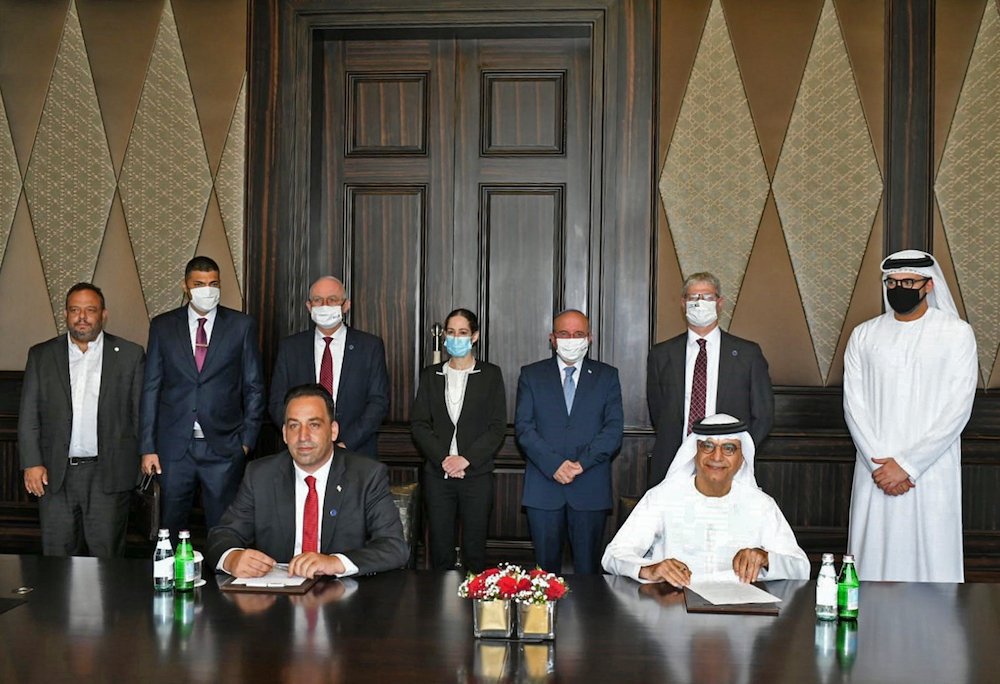
A handout image provided by the United Arab Emirates News Agency (WAM) on September 1, 2020 shows Israeli and Emirati officials signing a protocol in banking and finance in Abu Dhabi. (AFP/File Photo)
“We’ve had lots of inquiries already from clients in several sectors, all of which need legal support in their new ventures in an unfamiliar environment,” he told Arab News.
From Tel Aviv, another lawyer-turned-entrepreneur echoed the widespread enthusiasm in Israel for the new opportunities in a country where politics previously made business very difficult.
Noa Mayer said: “The first question I’m being asked by clients is, ‘When are we traveling there?’ Many Israeli companies in many sectors are enthusiastic and hopeful that it will be a beneficial thing for all of us.”
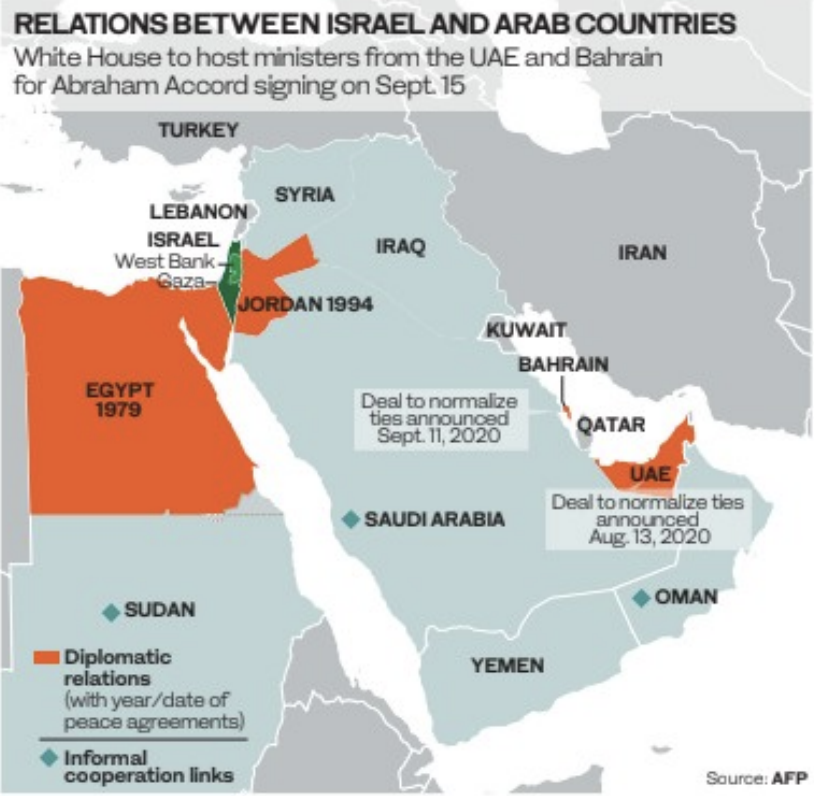
It is not just in the financial sector, but in the physical world of trade, commerce and brick-and-mortar investment that people see potential.
One of the most interesting, and glamorous, is in the field of precious stones and commodities such as gold, in which Jewish businessmen have traditionally been preeminent worldwide.
The Dubai Multi-Commodities Centre (DMMC), which is home to the Dubai Diamond Exchange and the Dubai Gold and Commodities Exchange, is planning to build on existing relationships with Israeli and Jewish traders.
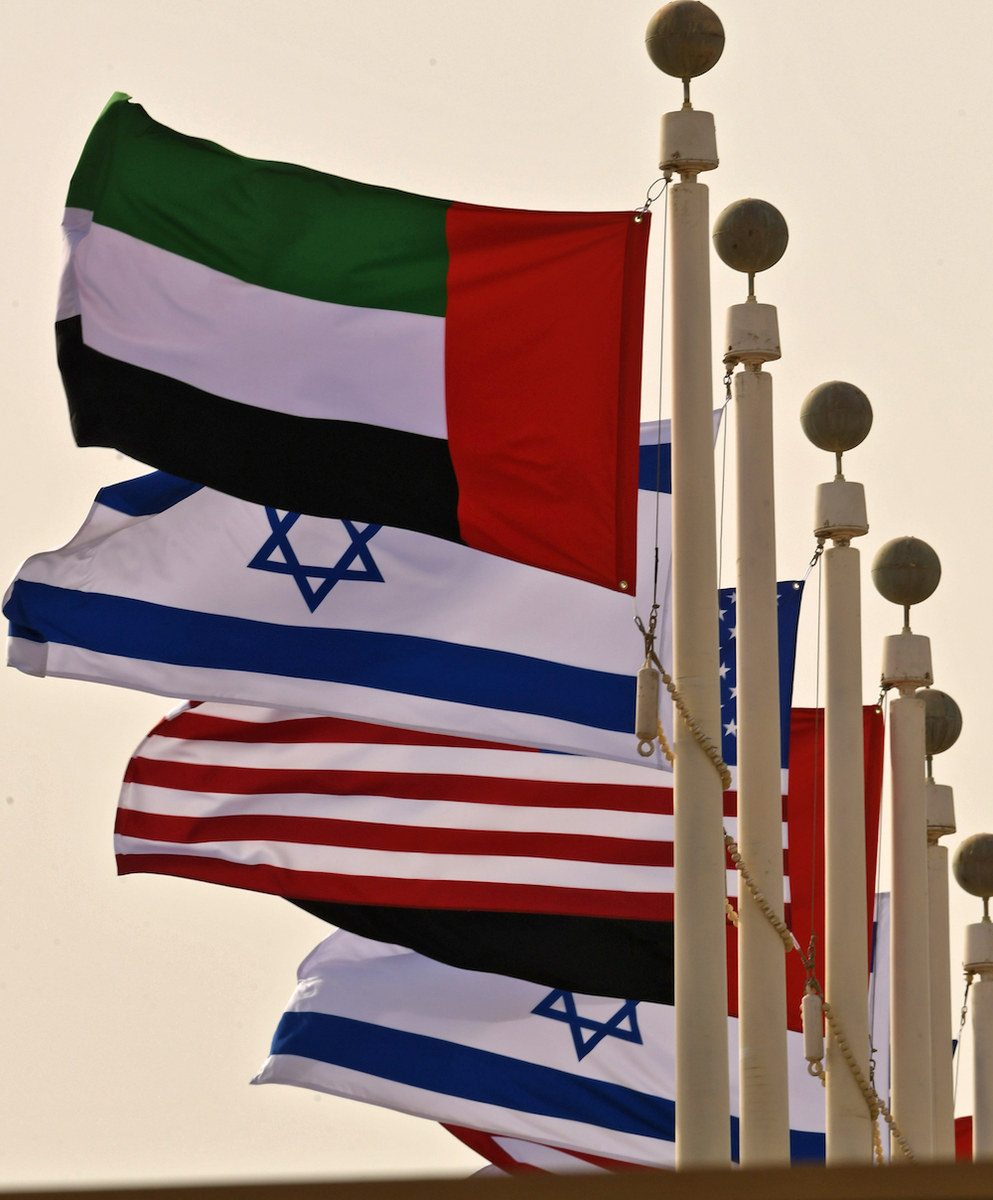
The Emirati, Israeli and US flags sway in the wind at the Abu Dhabi airport at the arrival of the first-ever commercial flight from Israel to the UAE, on August 31, 2020. (AFP)
A person familiar with DMMC plans said it is close to announcing a big deal that will “normalize” its own contact with Israeli businesspeople, who previously had to take a roundabout air route under a non-Israeli passport to take part in the many diamond and gold events that the DMMC organizes.
“It’s going to be very big for us. We can do normal business with our Jewish partners at last,” said one executive.
In terms of sectoral opportunities, the potential for Israeli-Gulf commerce seems almost endless. Energy, still the biggest Gulf product by far, is an obvious area.
“There’s crude oil and gas in abundance here, while Israel has a growing gas industry. Our expertise could go a long way,” Al-Binali said.
Technology too is a big area for cooperation, as Mayer pointed out: “Israel is known as the ‘startup nation,’ and friends have told me that Dubai is the ‘smart city.’ I see big opportunities for mutual benefit in cooperation in technology startups, indeed for any ventures at the cutting edge of technology — life sciences, digital health, the biomedical sector.”
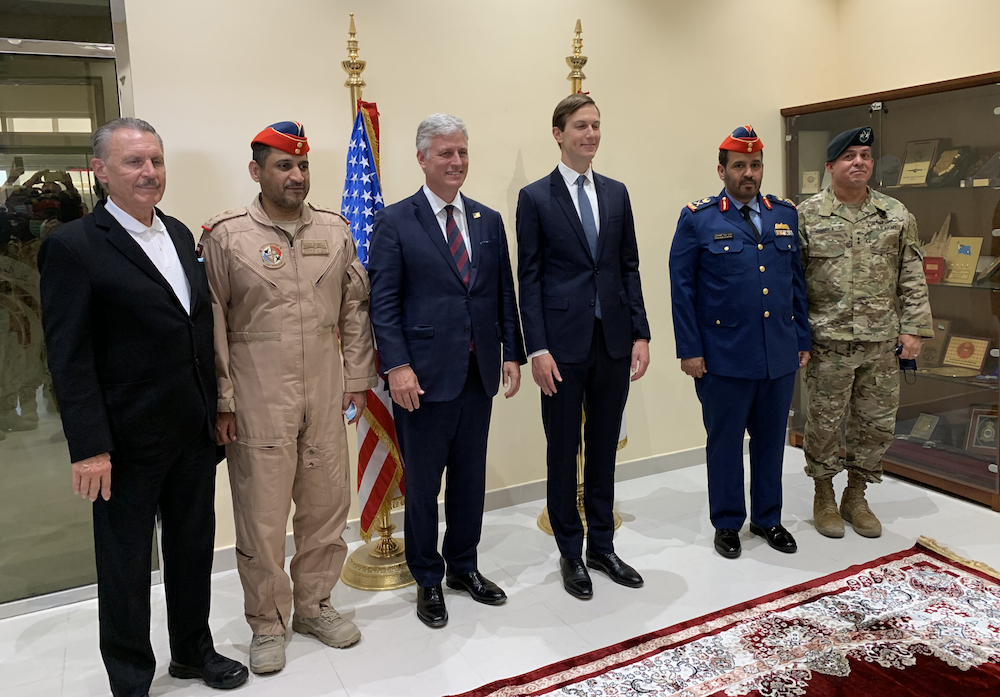
US Presidential Adviser Jared Kushner (C-R) and US National Security Adviser Robert O’Brien (C-L) pose for a picture with Emirati military officials after signing the text at the Al-Dhafra base, about 32 kilometres south of Abu Dhabi on September 1, 2020.
Leaving aside the big-ticket but politically problematic defense sector, where arms sales might set alarms ringing in some parts of the world, there is plenty of scope for cooperation in the cyber and digital industries, in which both Israel and the Gulf already have expertise.
Advanced agriculture too is full of capability. The idea of Israel as the country that “made the desert bloom” owed much to the legends of the state’s foundation, but both Israel and the Arab world have developed advanced scientific agricultural techniques to make the most out of inhospitable land, and more cooperation and exchange of ideas would only bring benefits.
“Everyone can learn from everyone else,” said Mayer, also highlighting tourism as a commercial business and as a medium of cultural exchange.
The Israel-Gulf rapprochement appears to have business benefits all round, not least in the area of physical trade.
The Tony Blair Institute for Global Change, set up by the former British prime minister who played a role in bringing about the historic UAE-Israel deal, estimated in 2018 that relaxed trading arrangements with Arab Gulf states could lead to as much as $25 billion extra in goods and services.
Opinion
This section contains relevant reference points, placed in (Opinion field)
An Israeli minister said just between his country and the UAE, it could reach $4 billion, including defense trade.
Bader Rock, the analyst at the Tony Blair Institute in Tel Aviv who helped compile the 2018 report, said it is difficult to put a final value on the commercial aspects of the entente until details of the new relationship are finalized, such as the possibility of a full free-trade agreement between them.
“Israel already traded with its Arab neighbors in many products. Our supermarkets are full of products that come from the UAE, Bahrain and even Saudi Arabia. Don’t forget that 20 percent of the population of Israel is Arab, and these products appeal to their taste,” Rock told Arab News.
“But until now, these goods have had to come through Jordan, Egypt or the Palestinian territories. Now trade will be free, and most people are very supportive of that. Countries like the UAE, Bahrain and Saudi Arabia were never regarded by Israel as business enemies.”
-----------------------
Twitter: @frankkanedubai





























